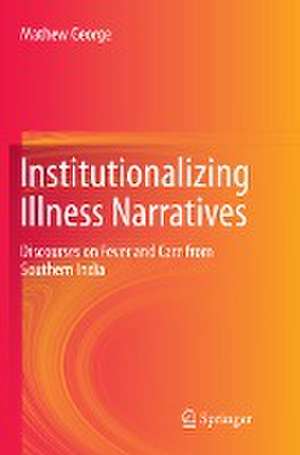Institutionalizing Illness Narratives: Discourses on Fever and Care from Southern India
Autor Mathew Georgeen Limba Engleză Paperback – 22 apr 2018
The study examines various discourses on fevers prevalent in the southern state of Kerala, which influence policy and programmatic dimensions of the state health services system. Fever care implies those aspects related to provisioning and cost involved among public and private sector hospitals. A second and more important dimension of this book is a critique of the culture of biomedical practice, informed by the social constructivist framework and approaches in the field of science studies. Overall, the book studies the processes by which physical symptoms like fever are treated as epidemics to be controlled, and are therefore brought within a biomedical system, thereby opening up options for commercialization of care.
| Toate formatele și edițiile | Preț | Express |
|---|---|---|
| Paperback (1) | 382.36 lei 6-8 săpt. | |
| Springer Nature Singapore – 22 apr 2018 | 382.36 lei 6-8 săpt. | |
| Hardback (1) | 389.70 lei 6-8 săpt. | |
| Springer Nature Singapore – 11 aug 2016 | 389.70 lei 6-8 săpt. |
Preț: 382.36 lei
Nou
Puncte Express: 574
Preț estimativ în valută:
73.17€ • 75.96$ • 61.01£
73.17€ • 75.96$ • 61.01£
Carte tipărită la comandă
Livrare economică 22 martie-05 aprilie
Preluare comenzi: 021 569.72.76
Specificații
ISBN-13: 9789811094736
ISBN-10: 981109473X
Ilustrații: XXVI, 169 p.
Dimensiuni: 155 x 235 mm
Greutate: 0.28 kg
Ediția:Softcover reprint of the original 1st ed. 2017
Editura: Springer Nature Singapore
Colecția Springer
Locul publicării:Singapore, Singapore
ISBN-10: 981109473X
Ilustrații: XXVI, 169 p.
Dimensiuni: 155 x 235 mm
Greutate: 0.28 kg
Ediția:Softcover reprint of the original 1st ed. 2017
Editura: Springer Nature Singapore
Colecția Springer
Locul publicării:Singapore, Singapore
Cuprins
Chapter 1. Interpreting Illness, Disease, Medicine and Medical Care.- Chapter 2. Historical Discourses on Fevers.- Chapter 3. Institutionalizing Fever Epidemics and Fever Care in Contemporary Kerala.- Chapter 4. Fear of Fevers: Risk, Medicalisation and Provisioning.- Chapter 5. Biomedicine Examined: Interpreting Culture of Fever Care. - Chapter 6. Voice of Illness and Voice of Medicine in Doctor-Patient Interaction.- Chapter 7. Fever talk as sub-culture of Fever care.
Notă biografică
Mathew George, MPH, PhD, is Assistant Professor and Chairperson of the Centre for Public Health, School of Health Systems Studies, Tata Institute of Social Sciences, Mumbai. He has training in public health with a doctorate in social medicine and community health from Jawaharlal Nehru University (JNU), New Delhi. His research interest is in the field of sociology of health and illness with special emphasis on the sociology of medical practice and medical knowledge in bio-medicine and also the interaction between multiple systems of medicine. Currently, he is working on the scope of restructuring the Indian health services system from a public health perspective, using a social epidemiological approach.
Textul de pe ultima copertă
This book is an ethnographic work that uses a critical medical anthropology approach to examine the concept of fever care in the context of southern India. Through a study of fevers, the study provides a critical overview to medical practice itself, as it is said that the history of fevers is also the history of medicine. This association between fevers and medicine is as relevant today, as this in-depth study of fever care reveals. Acknowledging the central role of health institutions in creating and propagating notions about illness in society, the author examines fever care through a study of hospitals.
The study examines various discourses on fevers prevalent in the southern state of Kerala, which influence policy and programmatic dimensions of the state health services system. Fever care implies those aspects related to provisioning and cost involved among public and private sector hospitals. A second and more important dimension of this book is a critique of the culture of biomedical practice, informed by the social constructivist framework and approaches in the field of science studies. Overall, the book studies the processes by which physical symptoms like fever are treated as epidemics to be controlled, and are therefore brought within a biomedical system, thereby opening up options for commercialization ofcare.
The study examines various discourses on fevers prevalent in the southern state of Kerala, which influence policy and programmatic dimensions of the state health services system. Fever care implies those aspects related to provisioning and cost involved among public and private sector hospitals. A second and more important dimension of this book is a critique of the culture of biomedical practice, informed by the social constructivist framework and approaches in the field of science studies. Overall, the book studies the processes by which physical symptoms like fever are treated as epidemics to be controlled, and are therefore brought within a biomedical system, thereby opening up options for commercialization ofcare.
Caracteristici
Puts forth a theoretical proposition to examine medical care not only as an issue of provisioning but also of practice Demonstrates the use of multi-site ethnography in understanding societal discourses that are ambiguous, especially in the context of an epidemic Calls for the need to humanize medicine, using the case of fevers care in Kerala Includes supplementary material: sn.pub/extras









